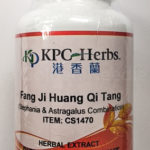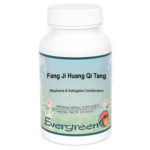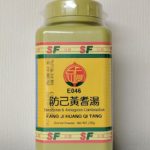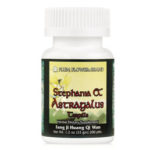Disclaimer For educational purposes only. Do not use as medical advice
AboutHerbsCaution/Notes
| Health Benefits |
| For: Nephritis • Rheumatic heart disease • Ascites (fluid retention in stomach) • Edema • Difficult urination |
| Attributes: |
| Categories (Click on ⌕ for other formulas in the category) |
| Category: Expel Dampness ⌕ Subcategory: Promote Urination and Leach Out Dampness ⌕ Family: Huang Qi Lei Fang ⌕ Source: Jin Gui Yao Lue ⌕ Related Formula: |
| Actions |
| Tonify Qi • Tonify Spleen • Increase urination • Mitigate edema |
| Indications and Contraindications |
| Appearance: Tongue -Pale • White Pulse -Floating Face/other - |
| Patterns: |
| Indications: Body feels heavy • Unexplained sweating • Trouble urinating |
| Contraindications: |
| Properties |
| Data adapted from product found online. Categories 4% or less not shown. |
|
| Herbs |
Cat/Dose |
Actions |
Properties |
| Huang Qi • Astragalus • 黄芪 ♠ |
Tonify Qi
3.8g |
Tonify Spleen Qi • Tonify protective qi • Tonify Lung Qi • Tonify Qi to move blood • Raise stomach yang qi • Improve urination • Relief Edema • Discharge pus • Generate fleshSheng - to dry damp • Chao - to tonify Spleen, stop sweating, calm fetus • Chao jiao - to stop diarrhea |
Antioxidant • Immune System Booster • Diuretic • Anti-aging • Hypoglycemic • Hypotensive • Hepatoprotective |
| Han Fang Ji ♠ |
3g |
|
|
| Bai Zhu • White Atractylodes Root • 白术 ♥ |
Tonify Qi
2.3g |
Tonify Spleen Qi • Stop sweating • Calms fetus • Dry dampness • Stabilize exterior • Stop sweating Bai Zhu is more Spleen focused while Cang Zhu is more for dampness |
Anti-inflammatory • Hepatoprotective • Immunity Booster • Hypoglycemic • Antibaterial |
| Zhi Gan Cao • Licorice Root • 甘草 ♣ |
Tonify Qi
1.5g |
Tonify Spleen Qi • Tonify Heart qi • Clear heat • Resolve toxicity • Stop cough • Dispel phlegm • Lubricate lungs • Stop wheezing • Reduce spasm • Relieve pain • Harmonize other herb effectsEnters all 12 channels, often serve as envoy in a formula. |
Hypoglycemic • Antiarrhythmic • Expectorant • Antidiarrheal • Antiulcer • Hepatoprotective • Antiulcer • Immunostimulant • Antitussive • Antiviral • Detox • Demulcent • Anti-inflammatory • Laxative • Emmenagogue • Antimicrobial • Spasmolytic |
| Sheng Jiang • Ginger (Raw) • 黄芩 ♦ |
Release Exterior Wind Cold
4 pieces |
Release exterior • Stops vomiting • Relieve Nausea • Stops cough • Reduce herb toxicity • Regulate central flow of Qi |
Expectorant • Cough Suppressant • Digestive • Hypotensive • Antiplatelet • Stimulant • Analgesic • Anti-inflammatory • Antipyretic • Cholagogic • Antiemetic • Antimutagenic |
| Da Zao • Jujube • 大枣 ♦ |
Tonify Qi
1 piece |
Tonify spleen • Tonify qi • Calm the spirit • Harmonize other herb's properties • Nourish blood |
Antibacterial • Antidepressant • Anti-inflammatory • Expectorant • Hepatoprotective • Hypotensive • Sedative |
| ♠ King/Chief ♥ Minister/Deputy ♣ Assistant ♦ Envoy |
| Directions: |
| Modifications |
For |
| + Xi Xin |
Severe cold14 |
| + Fu Ling +Cang Zhu |
Heavy dampness with heaviness in lower back and legs14 |
| + Bai Shao |
Abdominal pain14 |
| + Ma Huang |
Wheezing14 |
| + Chen Pi+ Zhi Ke + Zi Su Ye |
Chest pains, stomach aches14 |
| + Wu Ling San |
Nephritis (kidney inflammation)14 |
|
|
|
|
|
|
|
|
|
|
|
|
| Caution |
ALERT: Contraindications of each herb - use with caution under these conditions:
Huang Qi: Autoimmune diseases • Exterior excess • Qi stagnation • Damp obstruction • Food stagnation • Yin deficiency
Bai Zhu: Autoimmune disorder • Yin deficiency with heat • Dehydration • Foods: black carp, Chinese cabbage, peach, plum and coriander
Gan Cao: High blood pressure • Low potassium • Pork • Seaweed • Chinese cabbage • Anti-diabetic drugs • Diuretic drugs
Sheng Jiang: Lung heat • Dry cough • Phlegm heat • Full heat • Yin deficiency with heat • Vomiting from stomach heat • Gallstones • Exterior deficiency with unexplained sweating • Horse meat
Da Zao: Epigastric discomfort and bloating • Food stagnation • Damp excess • Damp Phlegm • Intestinal worms |





0 Comments